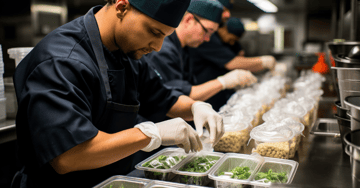Global commerce is undergoing a profound shift, and multinational corporations' environmental and ethical footprints are under increased scrutiny. Food industry operators face unprecedented pressure to demonstrate responsible sourcing practices, and there is a collective recognition of the urgent need to preserve our planet's ecosystems and uphold ethical standards within complex supply chains.
The Growing Pressure to Tackle Deforestation
Deforestation is one of the most pressing environmental challenges facing global food supply chains today. Agricultural expansion for commodities like soy, palm oil, beef, and cocoa is a leading driver of forest loss, significantly impacting biodiversity, carbon emissions, and local communities. As a result, regulatory bodies worldwide are increasing their focus on deforestation-free and ethically sourced supply chains.
Dive Deeper: Achieve Compliance & Sustainability Goals in Non-US Markets

New regulations outside the US, such as the EU Deforestation Regulation (EUDR) and the UK’s Environment Act, require businesses to demonstrate that their products are not linked to illegal deforestation. In many cases, compliance also includes demonstrating that sourcing practices meet ethical standards. For companies operating in global markets, this means having robust traceability and compliance systems that track the journey of raw materials from source to shelf.
The Challenges of Managing Deforestation Risks
For multinational businesses, tracing deforestation-linked commodities through complex, multi-tier supply chains is a daunting task. Many suppliers operate in regions where land-use regulations vary, and working conditions can be difficult to verify, making ethical and environmental compliance challenging. Without clear visibility, companies risk reputational damage, regulatory penalties, and disruptions to their supply chain.
Digital Download: Consumer Sentiment Report: Food Transparency & Recall Responsiveness
Besides compliance, consumers and investors are increasingly demanding sustainability and ethical sourcing. Businesses that fail to act face increasing scrutiny, as transparency, responsibility, and values-based sourcing become key competitive differentiators.
How Traceability, Compliance & Ethical Sourcing Help Mitigate Deforestation Risks
To combat deforestation effectively, businesses need comprehensive supply chain visibility and ethical sourcing frameworks. This means not only knowing who their suppliers are but also understanding where and how ingredients are sourced, and under what conditions. Key measures include:
- Collecting Data in Real Time: Ensuring supplier transparency and accountability
- Verifying Sourcing Locations: Mapping supply chains to confirm deforestation-free and ethical practices
- Assess Risk and Measure Compliance: Identifying high-risk suppliers and taking proactive measures
Listen Up: Climate Change and AI in Agricultural Supply Chains with Francisco Martin-Rayo
With robust traceability and a commitment to ethical sourcing, companies can meet evolving regulatory demands while strengthening their social and environmental credentials.

How FoodLogiQ Supports Deforestation-Free and Ethically Sourced Supply Chains
At Trustwell, we understand the challenges of ensuring supply chain transparency. That’s why our suite of FoodLogiQ software solutions is designed to help businesses track, verify, and manage their global supply chains more effectively.
- Supplier Transparency: FoodLogiQ provides centralised supplier data, enabling businesses to validate sourcing locations, certifications, and ethical sourcing credentials.
- Real-Time Monitoring: Our platform offers live insights into supply chain risks, helping companies detect and mitigate potential deforestation and ethics-related threats.
- Automated Compliance: FoodLogiQ supports businesses in meeting non-US regulations like the EU Deforestation Regulation and the UK Environment Act, as well as internal codes of conduct and ethical sourcing policies.
- Incident Management: With built-in alert systems, businesses can quickly respond to potential deforestation- or ethics-related supply chain issues.
With access to these capabilities, companies build resilient, compliant, and ethically sound supply chains while maintaining consumer trust.
Preparing for the Future of Deforestation Compliance and Ethical Sourcing
As regulatory frameworks continue to evolve, businesses must stay ahead of the curve. Emerging technologies such as blockchain, AI-driven risk analysis, and satellite monitoring are shaping the future of compliance and responsible sourcing. By investing in robust traceability and ethical sourcing solutions today, companies can safeguard their operations against future regulatory shifts and ensure long-term sustainability.
The need for deforestation-free and ethically sourced supply chains has never been greater. With increasing global regulations and growing consumer expectations, businesses must take proactive steps to enhance traceability, compliance, and ethical sourcing.
FoodLogiQ provides the tools and insights needed to navigate this complex landscape, and we can help your business build a more transparent, sustainable, and responsible supply chain. See how we've helped companies like sweetgreen meet their sustainability and social responsibility goals, then get in touch with one of our traceability experts to get started with a personalised demo.
Other posts you might be interested in
View All Posts
Quality Management
9 min read
| February 21, 2025
Overcome These Top 4 Food Quality Challenges in a Changing Industry
Read More
10 min read
| November 14, 2024
7 Allergen Control Strategies for Airline Caterers
Read More
Industry Regulations
15 min read
| August 15, 2024

